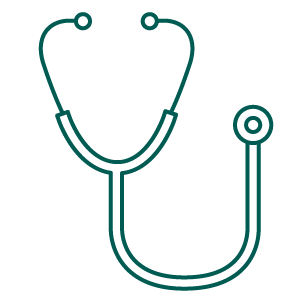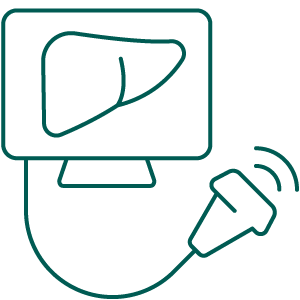Your liver is amazing
Your liver is the biggest organ inside your body. It sits just under your rib cage on the right side of your abdomen. The liver performs over 500 vital functions every day, including cleaning and processing almost everything you eat, drink or rub on your skin and helps your body get rid of toxins. It helps you to break down and distribute proteins, carbohydrates, fats and vitamins, regulates your hormones, and helps to turn your food into energy. It works hard and has an amazing ability to repair itself – but it can only do so much.
If your liver is unwell, it can have severe consequences for you. Liver disease can be genetic but can also result from liver damage caused by viruses, alcohol use, certain medications and fatty liver disease.
Over time, damage caused to the liver can lead to scarring, which can become severe and irreversible (called cirrhosis). Cirrhosis can progress to life-threatening liver failure and also puts you at risk of developing primary liver cancer.
Fast facts about liver disease

Liver disease is common
and affects 1 in 3 Australians.

1 in 4 Australians has
fatty liver disease.

Non-alcohol-related fatty liver disease is the biggest worldwide cause of chronic liver disease.

Almost 1000 Australians die annually from hepatitis B and C-related liver disease.

Liver cancer is the fastest-growing cause of cancer death in Australia.

More than 7000 Australians die each year from chronic liver disease.
But it’s not all doom and gloom.
Early detection and treatment could save your life.
In fact, 9 in 10 cases
of liver disease can be prevented.
Know your risk factors
Some causes of liver disease cannot be controlled, such as genetics or auto-immune diseases. However, the three main causes of liver disease can, to some extent, be managed. The top three preventable causes of liver disease are:
Excessive alcohol consumption
Alcohol can cause significant harm to your liver.
Your specialist can discuss strategies to reduce harm from alcohol, including access to support services, medications and ongoing monitoring.
Metabolic Syndrome
By controlling health conditions such as diabetes, hypertension and cholesterol problems, the risk of getting liver disease can be reduced or prevented.
Other risk factors include:
- Age – Liver disease is most common between 50 and 65.
- Diabetes, heart disease or high blood pressure
- Being exposed to viral hepatitis
- Certain medications
- Some alternative or herbal medicines or tonics, including those bought on the internet
- Taking too much of a medicine such as for pain
- Genetics
- Including iron overload conditions such as haemochromatosis
- Having an immune condition, where your body may mount a reaction against the liver.
Prevention or early detection could save your life
Preventing liver disease is essential because there may be very few symptoms in the early stages of liver disease. Often, symptoms only develop in advanced cirrhosis (called ‘decompensated’ cirrhosis), when there may be limited treatment options and quality and length of life may be reduced.
The first step in prevention is living healthily, only drinking at a low level (or not at all), exercising, and getting routine liver checks. These actions can potentially save your life.
Symptoms to look out for:
If you have early liver disease, you often have no symptoms. As your liver disease progresses, you might feel more tired and weaker than normal. You may also
- feel generally unwell
- be losing weight and muscle mass
- have spider veins on the skin above the level of your waist
- have red, blotchy palms
- have disturbed sleep
- Yellowing of your eyes and or skin, and dark urine
- Distended abdomen
Symptoms of more severe disease will depend on the condition and how much damage there is to your liver.
Liver Care Services
At GMS, we offer a range of services to help prevent, diagnose, treat and manage conditions of the liver.

Metabolic Liver Consultation
A comprehensive analysis of your liver health, including a detailed history, physical exam and a Fibroscan® to help identify issues and a treatment plan.

Fibroscan® Consultation
A non-invasive, painless investigation using ultrasound technology to assess your liver health, including your results.
Our top 8 tips for protecting your liver
If you follow the tips below, you’ll be well on your way to safeguarding your liver.
Reduce or stop drinking
Excessive alcohol intake can damage the liver. To protect yourself, avoid or minimise drinking.
Quit smoking
Cigarettes contain more than 4,000 poisons that the liver needs to clear from the body. Smoking increases your risk of metabolic health issues, including heart and lung disease and potentially even cancer.
Eat a healthy, balanced diet
Eating balanced, nutritious foods, drinking plenty of water and avoiding saturated fats, added sugars and salt, along with exercise, can not only reduce the risk of getting liver disease but also Type 2 diabetes and heart attacks or strokes.
Drink coffee
Recent studies show that drinking coffee regularly can protect you from chronic liver disease (CLD). It doesn’t matter what type of coffee you drink. However, be careful not to drink too much sugar, which defeats the purpose.
Take care with medications
Medications, even over-the-counter paracetamol, in excessive amounts, can damage the liver. Read the label and speak to your doctor if you have any concerns with your medications.
Travel safely
Getting vaccinated for Hepatitis A & B and Yellow Fever when travelling, drinking purified or boiled water, and eating fresh foods (avoid salads or fruit you can’t peel yourself) to protect your liver.
Be careful with body art, piercing and needles
Contaminated needles and inks can expose you to Hepatitis B and C, viruses in the blood that can cause severe and fatal liver disease.
Practise safe sex
Hepatitis B is a liver disease that can be transferred during intercourse with an infected person. To be safe, wear a condom, get vaccinated against Hep B and see your doctor if you have any concerns.
Look after your liver
While it has a fantastic ability to heal itself, it does have its limits. If you have any concerns or would like to check your liver health, book a consultation with GMS. Our specialists are here to help you assess, diagnose and treat conditions of the liver.
Your questions answered
Here are some answers to commonly asked questions about the liver:
What are the primary functions of the liver?
The liver plays a vital role in your body’s digestion, metabolism, and detoxification. It has numerous functions, including metabolising nutrients, detoxifying harmful substances, storing glycogen, producing bile for digestion, and synthesising important proteins.
What are the most common liver diseases?
The most common liver diseases include non-alcoholic fatty liver disease (NAFLD), alcoholic liver disease (ALD), and viral hepatitis.
What are the symptoms of liver problems?
There are very few symptoms in the early stages of liver disease. Often, symptoms only develop in advanced cirrhosis. These symptoms may include fatigue, jaundice (yellowing of the skin and eyes), abdominal pain, dark urine, pale stools and unexplained weight loss.
How can I keep my liver healthy?
Maintaining a healthy lifestyle, including a balanced diet, regular exercise, limited alcohol consumption, and avoiding excessive over-the-counter medications and illicit drugs, can help keep the liver healthy.
Can the liver regenerate?
Yes, the liver has a remarkable ability to regenerate. It can regrow lost tissue and return to normal function even after significant damage, such as from injury or surgery.
What is cirrhosis, and what causes it?
Cirrhosis is the scarring of the liver tissue due to long-term liver damage. It can be caused by chronic alcohol abuse, viral hepatitis, fatty liver disease, and other factors.
What is viral hepatitis, and how is it transmitted?
Hepatitis is an inflammation of the liver. It can be caused by various viruses (hepatitis A, B, C, etc.) and transmitted through contaminated food or water, sexual contact, or exposure to infected blood.
How is liver cancer diagnosed and treated?
Liver cancer is often diagnosed through a combination of blood tests and imaging. Treatment options are personalised following patient discussion and a multidisciplinary team meeting.
What is fatty liver disease (FLD), and can it be reversed?
Fatty liver disease occurs when fat accumulates in the liver cells. Non-alcoholic fatty liver disease (NAFLD) is common and can often be managed through lifestyle changes, including weight loss and dietary modifications. However, advanced stages of NAFLD may progress to cirrhosis.

